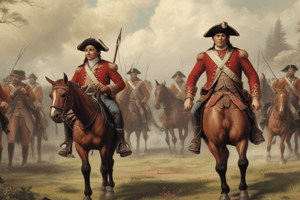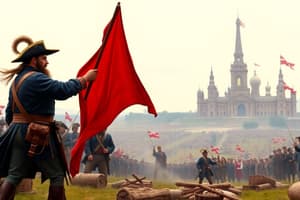Podcast
Questions and Answers
What was one of the primary causes of the French and Indian War?
What was one of the primary causes of the French and Indian War?
- The signing of the Magna Carta by British settlers
- Religious conflicts between settlers and Native Americans
- Desire for control of the fur trade in the Ohio River Valley (correct)
- Attempts by the Spanish to reclaim territory in North America
Which Native American tribe primarily allied with the French during the French and Indian War?
Which Native American tribe primarily allied with the French during the French and Indian War?
- Cherokee
- Iroquois
- Sioux
- Huron (correct)
What was the primary goal of the Albany Congress?
What was the primary goal of the Albany Congress?
- To draft a declaration of independence from British rule
- To unify the colonies against Native American resistance
- To convince the Iroquois to ally with the British (correct)
- To encourage more intercolonial trade agreements
What did Ben Franklin propose at the Albany Congress?
What did Ben Franklin propose at the Albany Congress?
What was the Proclamation of 1763?
What was the Proclamation of 1763?
Americans followed the Proclamation of 1763 and did not move westward.
Americans followed the Proclamation of 1763 and did not move westward.
What were two taxes imposed by the British on the American colonists?
What were two taxes imposed by the British on the American colonists?
The British army expected American colonists to provide resources through the ______ Act.
The British army expected American colonists to provide resources through the ______ Act.
What was the main financial motivation behind the end of salutary neglect?
What was the main financial motivation behind the end of salutary neglect?
The Currency Act allowed only British pounds to be used.
The Currency Act allowed only British pounds to be used.
Flashcards are hidden until you start studying
Study Notes
Important Dates
- 1754 marks the beginning of the French and Indian War.
- 1800 witnessed the emergence of the first political party system in the United States, featuring Democrats, Republicans, and Federalists.
The French and Indian War
- A North American conflict between British and French forces, integral to the Seven Years' War in Europe.
- Imperial Rivalry: Both nations aimed for global dominance, fueling tensions.
- Control of Beaver Fur: Competition over the lucrative fur trade, particularly in the Ohio River Valley, was a significant factor.
- Native Alliances: The Huron tribe allied with the French, while the Iroquois supported the British due to stronger ties with them. The French were perceived as more amiable.
George Washington's Role
- British forces dispatched George Washington to secure French forts in the Ohio River Valley.
- Washington's mission ended unsuccessfully, highlighting the early military challenges.
Albany Congress
- A pivotal intercolonial conference held in New York, attended by representatives from seven colonies.
- Main Goal: Secure an alliance with the Iroquois Confederacy, the strongest Native American alliance, through gifts and assurances of respecting their autonomy.
- Secondary Goal: Benjamin Franklin proposed a "plan of union," aimed to create a unified intercolonial government to facilitate war efforts against the French.
- The plan was ultimately rejected by the colonies, driven by fears of losing individual autonomy, marking a significant early attempt at colonial unity.
Causes of the American Revolution
- British perception of American colonists as inferior led to a repressive relationship.
- Restrictions on trade fueled resentment as colonists sought economic independence.
- Native American forces targeted British ports like Detroit, creating conflict.
Impact of Pontiac's Rebellion
- The Proclamation of 1763 established a boundary line to separate British settlers and Native territories.
- American colonists largely disregarded the Proclamation, continuing westward expansion, heightening tensions.
Impact of the French-Indian War
- The war imposed significant financial strain on Britain, altering colonial governance.
- The end of salutary neglect marked a shift to stricter oversight of colonial affairs to manage war debts.
- Key taxation measures included:
- Stamp Act: Imposed a direct tax on all printed materials, aggravating colonial grievances.
- Sugar Act: Levied taxes on imported non-British goods, like molasses and sugar, affecting trade.
- Quartering Act required colonists to provide provisions and housing for British troops, bred resentment.
- Currency Act mandated the exclusive use of British pounds in the colonies, disrupting local economies.
Studying That Suits You
Use AI to generate personalized quizzes and flashcards to suit your learning preferences.




